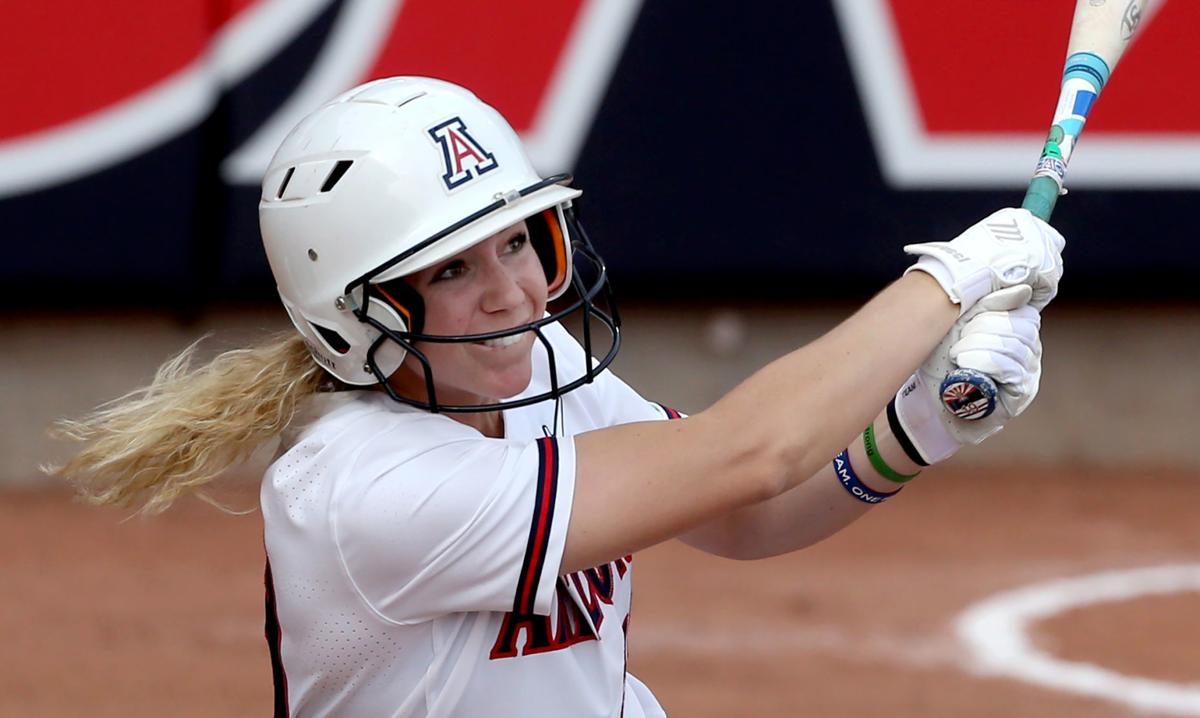Arizona is making its 33rd straight postseason appearance in the NCAA Tournament, but what makes this year different?
Here’s a look into Arizona’s Women’s College World Series quest and what the postseason could mean for the Wildcats, who host Harvard in their first game of the Tucson Regional on Friday night:
Top eight seeds
The NCAA Tournament is led, in order, by the following teams: No. 1 Oklahoma, No. 2 UCLA, No. 3 Washington, No. 4 Florida State, No. 5 Florida, No. 6 Arizona, No. 7 Minnesota and No. 8 Alabama. The top eight seeds are favored to host a Super Regional and advance to the Women’s College World Series.
Arizona is no stranger to any of those teams, having played against all of them this season. The Wildcats lost to Alabama 6-1, but kept it close with Florida and Oklahoma — losing each game by only one run. During the Wildcat Invitational in March, Arizona beat Minnesota 2-0.
The Wildcats were swept by Washington, but took one from Florida State in a three-game series just before conference play and upset UCLA twice to close out the regular season.
“I think definitely, we’ve had some experiences that have helped us grow, not so much physically, but mentally,” coach Mike Candrea said.
“I think the Washington series, as tough as it was to falter in some situations because the moment got a little big on us, I really felt like it helped us at UCLA, to be able to keep things cool, calm and collected when things got a little heated. And I really felt like the roles were reversed for them.”
Butterflies ‘in formation’
When it comes to a trait teams that play in the NCAA Tournament share, Candrea said he believes it’s being able to play in the moment. Teams should be able to handle tough situations, moments when things aren’t going well, and have people ready to step up when needed.
After being swept by Washington, Candrea didn’t doubt his team, but definitely had concerns about whether they could prove themselves in tough situations.
It’s OK to be nervous and have butterflies against a tough opponent, but the butterflies can’t be flying all over the place.
During the regular-season finale at UCLA, the Wildcats proved themselves to their coach — upsetting the Bruins twice in Los Angeles. The newfound mindset should help the momentum continue into the postseason.
“I thought we played very consistent (at UCLA),” Candrea said. “We played in the attack mode. We had some moments that we could have let the moment get big and we didn’t.
“So, I think the butterflies were definitely flying in formation and they weren’t scattered all over the place.”
Playing the long ball
Arizona is currently second in the nation in home runs per game (1.83), behind Oklahoma (1.90). The Wildcats claimed the UCLA series by playing the long-ball game while bringing their total home run count to 99.
The Tucson Regional will feature three of the nation’s top 12 home run hitters: UA teammates Jessie Harper (25) and Dejah Mulipola (21), along with Auburn’s Kendall Veach (20). Arizona also has Alyssa Palomino-Cardoza with 15 home runs and Malia Martinez with 13. Auburn adds Tannon Snow with 13 homers of her own.
Harper leads the Pac-12 and is tied for the top spot nationally with Mia Davidson from Mississippi State. Harper doesn’t think of herself as a power hitter — she doesn’t even care about home runs, unless they help the Wildcats win games.
“Just being competitive up at bat and not being an easy out is what I strive for, but yeah, I’ll take the home runs as long as it helps our team win, that’s for sure,” Harper said.
Injuries
Second baseman Reyna Carranco suffered a broken left hand and broken right thumb during the second game of the Washington series in early May. While potentially a season-ending injury, Candrea said they are approaching it on a day-to-day basis.
During the series finale at UCLA, Palomino-Cardoza fouled a pitch into her face and was removed from the game. While Palomino-Cardoza has missed two of the last three postseasons due to injury, it doesn’t look like the red-shirt junior will have to miss this year’s action.
“Alyssa’s fine,” Candrea said. “She’s got a hard head. It hit her in the right spot.”
Showing off Rita
Since its last appearance in the WCWS in 2010, Arizona has made it to the Super Regionals in seven of the eight seasons. Of the seven Supers, the Wildcats hosted twice — most recently two years ago when Arizona was upset by Baylor.
Now, the Wildcats are excited to once again stay home as long as possible until either their season ends or they hit the road to Oklahoma City for the WCWS.
The potential to host the first two weeks of the postseason has added meaning since the remodel of Hillenbrand Stadium. Arizona rang in the 2019 season in a newly-remodeled Hillenbrand, 25 years after Candrea had the stadium built.
“Personally, I’m very proud of it,” Candrea said. “It took 34 years to get it to this point. For me, it’s a lot of gratification to finally see it and be able to play in it.”
Missouri transfer Rylee Pierce is no stranger to the postseason, but this will be her first (and only) postseason in an Arizona uniform. Her freshman year, Mizzou was a 15 seed and hosted a regional, but wasn’t able to host the following two years.
Now, Pierce is excited to see the NCAA Tournament action at Hillenbrand.
“This place is an amazing place to play at,” Pierce said. “So, I’m really excited to see what the (postseason) atmosphere is like.”





